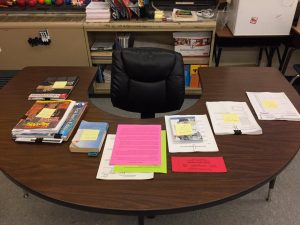TL;DR
- Knowing the content of what you are teaching will help you be more confident as a substitute.
- Know where to look for help; it’s ok that you don’t know everything.
- Use the resources available to support student learning.
Stretching Outside of Your Comfort Zone
I received a bachelor’s degree in elementary education in May 2008 and began working that fall as a substitute teacher. Most of the assignments I took that first year were at elementary schools because that was my background. One day I got a call regarding an assignment for a high school math teacher. I accepted the role and quickly realised that I was not as prepared for it as I had thought.
 One of the sections I was teaching that day was the Advanced Placement Calculus class. The students were preparing for the AP exam, which would determine whether or not they would receive college credit for their work. I came upon a question that none of them understood. They asked me for help and I was totally baffled. There was no teacher’s edition of the assignment with answers because they were doing a practice test and the teacher had not left an answer key. In a burst of inspiration, I pulled up Twitter and posed the students’ question. Within moments, someone in my Twitter network responded, the students all understood what the response meant, and they were able to continue with their work.
One of the sections I was teaching that day was the Advanced Placement Calculus class. The students were preparing for the AP exam, which would determine whether or not they would receive college credit for their work. I came upon a question that none of them understood. They asked me for help and I was totally baffled. There was no teacher’s edition of the assignment with answers because they were doing a practice test and the teacher had not left an answer key. In a burst of inspiration, I pulled up Twitter and posed the students’ question. Within moments, someone in my Twitter network responded, the students all understood what the response meant, and they were able to continue with their work.
Know Your Content
This experience 11 years ago taught me a valuable lesson about knowing the content you are teaching as a substitute teacher. There are three ways that you can do this:
- Rely on your own knowledge.
- Rely on the teacher’s guide.
- Rely on others’ knowledge.
Let’s consider each of these strategies and how they can prepare you for your time in the classroom as a guest teacher.
Rely On Your Own Knowledge
You know things. Lots of things. As a substitute teacher, this is going to help you. If you know you have specific strengths, select teaching assignments that will let you use those strengths. For example, I know of a retired teacher who was a high school special education teacher. Now she is substituting in my district and intentionally selects special education assignments as often as possible. I know of a trained artist who is a substitute teacher and always takes art assignments when they come up.
You know things. Lots of things. As a substitute teacher, this is going to help you. If you know you have specific strengths, select teaching assignments that will let you use those strengths. Share on XRely on the Teacher’s Guide
I know many educators who look down on textbooks and teacher guides, but I believe that they have a very valuable place in the classroom as a source of foundational information and resources. The teacher’s guide doesn’t contain all of the information, but it provides enough to get through a basic lesson. For substitute teachers, this can be particularly beneficial, especially when stepping into the middle of a unit and not knowing what the students have done or need to do.
One of my more memorable substituting experiences came when I filled in for a high school English teacher who was on her third unexpected absence. Her previous substitutes had not left any notes so her sub plans said, essentially, “Here is all of the work the students were supposed to have done. Please do what you can and leave me a note.” I was able to use the teacher’s guide to walk the students through three days of assignments in one day. The students had done the work the previous days, but their teacher didn’t know, so all I needed to do was lead the review. Because of this experience, I was asked to be the English teacher’s dedicated sub!
Rely on the Knowledge of Others
Colleagues. Friends. Twitter. Facebook. Voxer. Instagram. Pinterest. There are so many avenues to find support when teaching an unfamiliar subject as a substitute teacher. True, many substitutes are expected to simply keep order in the classroom and make sure that nobody gets hurt. But a substitute teacher should also seek to teach. If you know ahead of time what your assignment is going to be, reach out to others and ask for advice. Contact the teacher, if you can, to find out what you will be teaching and what they expect you to do. Use social media to find answers to puzzling questions. Show students what you are doing and explain how you are using these tools so that they can begin to develop their own sense of digital media literacy and competency.
Tips for Teachers
 You may not like the teacher’s edition. You may not even use it. However, it can be an essential lifeline for your guest teachers. Leave the teacher’s edition in an easy-to-find place with the lesson for day clearly marked and easy to turn to. (I love to use binder clips so that the only part that will open is the part with the lesson the guest teacher needs to access.) If you don’t have a teacher’s edition, leave an answer key or other document for your guest teacher. If possible, share these documents ahead of time to give them time to prepare.
You may not like the teacher’s edition. You may not even use it. However, it can be an essential lifeline for your guest teachers. Leave the teacher’s edition in an easy-to-find place with the lesson for day clearly marked and easy to turn to. (I love to use binder clips so that the only part that will open is the part with the lesson the guest teacher needs to access.) If you don’t have a teacher’s edition, leave an answer key or other document for your guest teacher. If possible, share these documents ahead of time to give them time to prepare.
Tips for Administrators
Do your teachers know where the teacher resources are? Do you know where they are? Some schools have a dedicated space in the library or a faculty room that has copies of teacher’s editions and other instructional resources. This can be a huge help for the substitute teacher who comes in and needs access to materials that may not be in the classroom or may not be easy to locate. Work with your librarian to put these resources in one place and make sure teachers and substitutes know how to find them.
[scroll down to keep reading]Tips for Substitutes
You don’t have to know everything, but you should know how to find what you need. Take assignments that you are comfortable with. Use your own background knowledge. Consult the teacher’s guides. Ask others for help. (In a later installment of this series, I will be sharing more tips and strategies on how to ask for help of those around you, including students).

About Alex T. Valencic
Alex Valencic is an educator, former small business owner, Boy Scout, volunteer drug prevention specialist, unrepentant bibliophile, and a geek of all things. He worked as a substitute teacher for three years before achieving his lifelong dream of teaching fourth grade, which he did for seven years in Urbana, Illinois, before accepting his current position as the Curriculum Coordinator for 21st Century Teaching and Learning in Freeport, Illinois, where he not only supports innovative educational practices in the classroom but also oversees social studies, science, and nearly all of the elective courses in the district.



